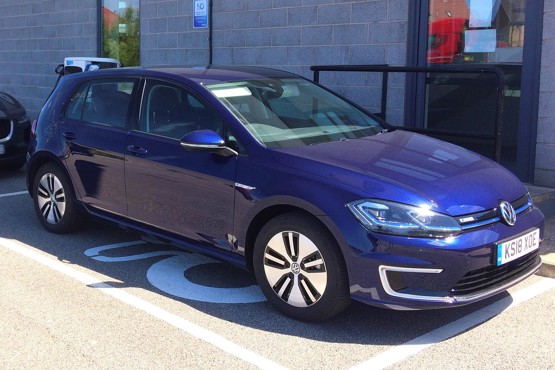Used electric vehicle (EV) buyers can afford to be more aspirational with their car purchasing plans thanks to a value decline that has impacted premium products hardest, according to Cap HPI.
The used car valuations expert’s director of marketing, Derren Martin, told AM that the shift in the value of EV values, which had seen widely-publicised slumps for the likes of Tesla’s Model 3, had led to a narrowing of the gap between the sector’s cheapest and more premium offerings – widening the opportunity for motorists.
“In the last six months the Nissan Leaf has declined by 34% while a Model 3 has come down in value by 30%,” said Martin in his regular mid-month catch-up with AM.
“Consider that meant a £9,000 decline for the Nissan but £14,000 for the Tesla and you see that the two cars have got £5,000 closer in price.
“Premium EVs have been hit far harder by the recent value movements and the result is that buyers car afford to be more aspirational, and perhaps get more for their money, than they had expected might be the case.”
Martin said the “more affordable” end of the used EV market was now feeling a slight softening of demand as a result of this shift.
It has meant that a zero emissions model could prove cheaper than their diesel or petrol equivalents in some cases.
 At three years and 30,000 miles Volkswagen’s e-Golf was now around £5,000 less than a 1.5-litre TSI Evo in Match trim, he said.
At three years and 30,000 miles Volkswagen’s e-Golf was now around £5,000 less than a 1.5-litre TSI Evo in Match trim, he said.
In the wider market, used car values at Cap HPI’s three-year, 60,000-mile benchmark were down 0.6% as of the end of last week, Martin said.
It is the sector's first decline in used car values this year.
The decline in value of used EVs had continued to outpace the market with an overall decline of 3.1% month-to-date.
Backing Martin's assertion that the smaller, cheaper end of the EV sector was now feeling the pinch, Cap HPIs data showed the DS 3 Crossback, Vauxhall Corsa e and MG ZS all down 7% this month alone, with Tesla’s Model 3 down by just 1.5% and the Model Y down by 1%.
Also marginally outpacing the decline of the wider market are older, more affordable petrol and diesel vehicles.
Martin said Cap HPI’s data showed cars aged 10 years and 100,000 miles were down by 1.1% in April after several months of showing strength as the go-to vehicles of motorists under pressure from the cost-of-living crisis.
Overall, Martin suggested April's trading had been “stable” and generally stronger than the norm for the post-March numberplate change month.
“With the traditional influx of product resulting from March and a slowing of demand due to the Easter break, it’s normally slow in April,” he told AM.
“Due to the limited volumes this year has been a bit better than normal. Last year values were down 2.1% in April, with a dip of 2.3% the pre-COVID trading of April 2019 and 0.8% in 2018.
“I suspect we’ll finish this month close to that 2018 figure.”
Martin added: “Overall, the market remains in a good position and while there has been a slight softening of demand, prices remain fairly stable, with only small movements for the most part.”
Earlier this month Auto Trader reported that the under-pricing of used car stock had cost UK car dealers £25.5 million in missed retail opportunity in March alone.
The online automotive marketplace revealed that the average forecourt missed out on £3,300 in potential margins last month as the price average used car advertised on its website rose by 2% year-on-year and 0.2% month-on-month to £17,712.
Speaking at the time, Auto Trader’s director of data and insight Richard Walker said: “Against a backdrop of political and economic uncertainty, used car prices, and the market more broadly, has gone from strength-to-strength in Q1."















Login to comment
Comments
No comments have been made yet.